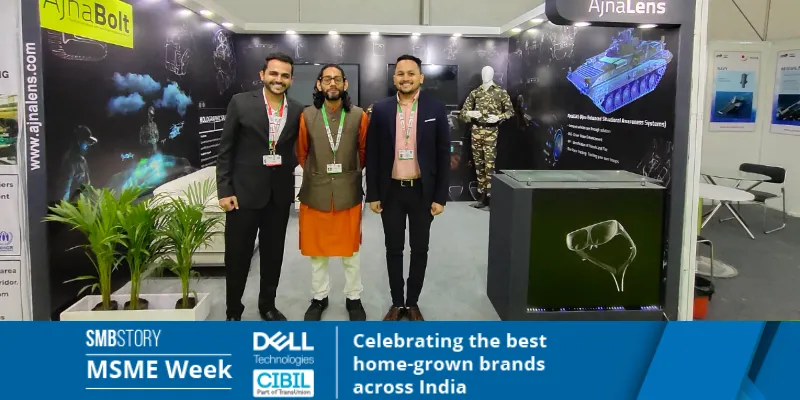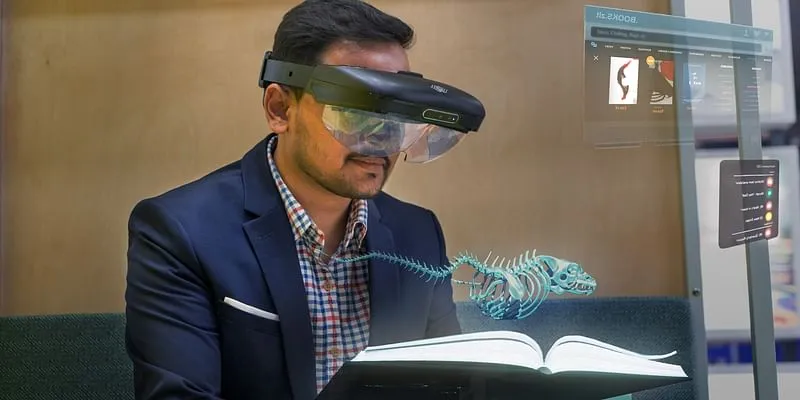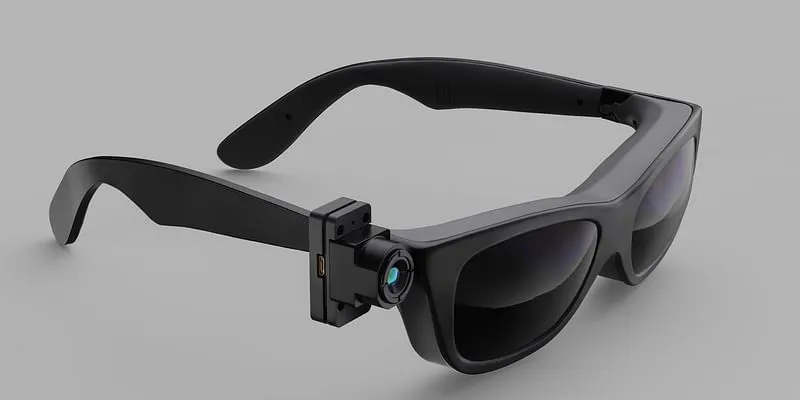This Mumbai company's AR and AI-powered smart glasses can scan 300 people at a time for COVID-19 symptoms
Founded in 2014, Ajna Lens develops smart glasses for defence and healthcare sectors. It counts DRDO, the Indian Army, and the Indian Navy among its clients.

Abhijit Patil COO, Abhishek Tomar CTO and Pankaj Raut, CEO, Ajna Lens
New-age technologies like augmented reality (AR) and virtual reality (VR) have changed our lives in the past decade.
Virtual reality — a computer-generated version of one’s environment — is used in the healthcare, gaming, graphics, and architecture industry. It completely transforms an individual’s environment by digitally powering it.
On the other hand, augmented reality became the talk of the town, thanks to social media platform Snapchat and the PokemonGo game, which only enhances one’s environment.
Both of these new-age technologies have proven to be revolutionary in the field of healthcare, especially in the areas of general diagnostics and medical training.
And, amidst the coronavirus pandemic, — a Mumbai-based AR goggles manufacturing company — has created AjnaTX smart glasses that can scan up to 300 people within three minutes, from three metres of distance, and identify people with COVID-19 symptoms in crowded places.

Revolutionising Indian tech
Engineers Pankaj Raut, Abhijit Patil, and Abhishek Tomar met at the ‘Startup Weekend’ event conducted by Google in 2014. While Pankaj and Abhijit had worked in the field of AR and thermal scanning, Abhishek worked with Red Chillies Entertainment as a Lead Technical Director.
While computers play a vital role in impacting the world, the founders realised that it is restricted to the 2D domain only. They explored opportunities in the field of augmented reality, and decided to build Ajna Bolt — a military-grade AI-powered mixed reality glasses.
Abhishek Tomar, one of the co-founders, says when the company began its operations in 2014, at the time, these technologies were at a nascent stage in India, and manufacturing AR/VR products was an intense, laborious process.
The company collaborated with researchers from Japanese universities to work on its product – Ajna Bolt. While it imported some of the product components from abroad, some were manufactured in-house at its Mumbai and Bengaluru facilities.
The company first tries to understand the environment by sensing the depth of the surroundings, and creates a real-time mesh out of it. It then amplifies any 3D digital hologram in real life.
“Working on this complex product was not easy. Working on the optics, the form factor, and the hardware was very challenging. Additionally, we wanted to develop a good-looking product that can be worn for hours with comfort and ease,” Pankaj Raut says.
While it took some time to build the product, however, the real challenge for the company came when the glasses underwent multiple trials with the DRDO and the army.
“These trials were exhausting, but they certainly helped us in polishing our product. Many times, the glasses broke because their usage was very rough. So, we had to ensure that the product was made with materials that can help it survive wear and tear,” Abhishek explains.
Since this product was built for the military, data security was another factor that played a big role while developing it.
The co-founder says, “We had to sync the glasses with all the military equipment and do the coding in a way that all the data that gets collected from the glasses is locked in the hardware of the military.”
It manufactured the first smart glasses Ajna Bolt for security and defence personnel, which helped the company get its first client in the Indian Army, followed by the Defence Research Development Organisation (DRDO), the Indian Navy, and the Ministry of Defence.
Apart from the military applications, these smart glasses are used in automobiles and manufacturing industries as well. Ajna Lens competes with the likes of Microsoft and Magic Leap globally, who have launched mixed reality smart glasses in the past, while in India, the company is one of its kind.
The company had been bootstrapped until it raised funding earlier this year from prominent people from the business ecosystem, such as Founder Vijay Shekhar Sharma, Maharashtra Defence and Aerospace Venture Fund (MDAVF), and HNI investors like Nailesh Khimji, Chirayu Khimji, Jay Jesrani, and the Mohsin Group.
At present, Ajna Lens has so far clocked a turnover of Rs 2 crore.

AjnaTx
Innovation in the time of COVID-19
The novel coronavirus pandemic brought unique challenges to entrepreneurs and the business ecosystem at large. But Ajna Lens used this adversity to pivot and innovate.
The company launched AjnaTX smart glasses in March this year, exclusively for COVID-19 frontline workers such as healthcare professionals, workers, and security personnel.
These smart glasses leverage new-age technologies such as augmented reality (AR), artificial intelligence (AI), image processing, and thermal scanning to scan up to 300 people within three minutes, from three metres of distance, and identify people with COVID-19 symptoms in crowded places.
Talking about the AjnaTX glasses, Abhishek says, “We are working on expanding the field of view to include as many people as people. Also, the software was changed in a way that only the temperature of the eyes and the forehead is recorded, and not of the whole body.”
The company is looking at collaborating with doctors and hospitals to start testing the product on coronavirus patients. In fact, it is in talks with the Delhi Metro Rail Corporation (DMRC), as well as Uttar Pradesh and Haryana state governments to push out its product.
“In the coming times, the demand for AR and VR technologies will increase. People want to adopt technologies to achieve the same things without meeting each other, which was otherwise possible when things were normal,” Abhijit Patil, one of the co-founders, says.
Further, Prime Minister Narendra Modi’s ‘vocal for local’ campaign will also help India prove the mettle of domestic manufacturers, Pankaj says. He adds, “Data is an extremely sensitive tool which must remain secure, no matter what. Our data landing on foreign servers is the worst possible scenario.”
Ajna Lens claims that it shares all its data with the Indian government to avoid any possible cyber attack.
Edited by Suman Singh








